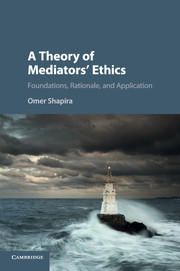Book contents
- Frontmatter
- Dedication
- Contents
- List of figures
- List of tables
- Preface
- Abbreviations of codes of conduct
- PART I A theory of professional ethics
- PART II A theory of mediators’ ethics
- PART III Dealing with ethical problems
- Appendix I A proposed model code of conduct for mediators
- Appendix II Model standards of conduct for mediators (2005)
- Bibliography
- Index
Appendix II - Model standards of conduct for mediators (2005)
Published online by Cambridge University Press: 05 March 2016
- Frontmatter
- Dedication
- Contents
- List of figures
- List of tables
- Preface
- Abbreviations of codes of conduct
- PART I A theory of professional ethics
- PART II A theory of mediators’ ethics
- PART III Dealing with ethical problems
- Appendix I A proposed model code of conduct for mediators
- Appendix II Model standards of conduct for mediators (2005)
- Bibliography
- Index
Summary
AMERICAN ARBITRATION ASSOCIATION
(ADOPTED SEPTEMBER 8, 2005)
AMERICAN BAR ASSOCIATION
(APPROVED BY THE ABA HOUSE OF DELEGATES AUGUST 9, 2005)
ASSOCIATION FOR CONFLICT RESOLUTION
(ADOPTED AUGUST 22, 2005)
SEPTEMBER 2005
The model standards of conduct for mediators 2005
The Model Standards of Conduct for Mediators was prepared in 1994 by the American Arbitration Association, the American Bar Association's Section of Dispute Resolution, and the Association for Conflict Resolution. A joint committee consisting of representatives from the same successor organizations revised the Model Standards in 2005. Both the original 1994 version and the 2005 revision have been approved by each participating organization.
Preamble
Mediation is used to resolve a broad range of conflicts within a variety of settings. These Standards are designed to serve as fundamental ethical guidelines for persons mediating in all practice contexts. They serve three primary goals: to guide the conduct of mediators; to inform the mediating parties; and to promote public confidence in mediation as a process for resolving disputes.
Mediation is a process in which an impartial third party facilitates communication and negotiation and promotes voluntary decision making by the parties to the dispute.
Mediation serves various purposes, including providing the opportunity for parties to define and clarify issues, understand different perspectives, identify interests, explore and assess possible solutions, and reach mutually satisfactory agreements, when desired.
Note on construction
These Standards are to be read and construed in their entirety. There is no priority significance attached to the sequence in which the Standards appear.
The use of the term “shall” in a Standard indicates that the mediator must follow the practice described. The use of the term “should” indicates that the practice described in the standard is highly desirable, but not required, and is to be departed from only for very strong reasons and requires careful use of judgment and discretion.
The use of the term “mediator” is understood to be inclusive so that it applies to co-mediator models.
These Standards do not include specific temporal parameters when referencing a mediation, and therefore, do not define the exact beginning or ending of a mediation.
Various aspects of a mediation, including some matters covered by these Standards, may also be affected by applicable law, court rules, regulations, other applicable professional rules, mediation rules to which the parties have agreed and other agreements of the parties.
- Type
- Chapter
- Information
- A Theory of Mediators' EthicsFoundations, Rationale, and Application, pp. 412 - 419Publisher: Cambridge University PressPrint publication year: 2016
- 2
- Cited by



